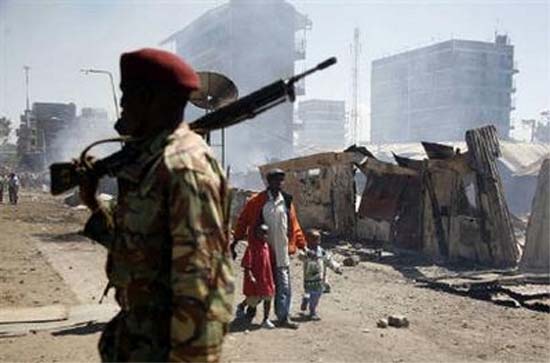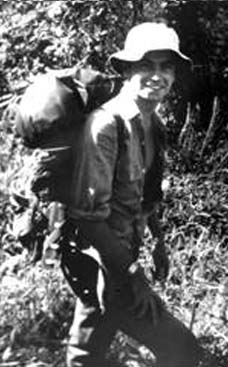
Sitting here, inside the house, there's not much to do. Seven of us, Peace Corps volunteers together for the holidays, ate dinner in more silence than accompanied our other meals today and yesterday. Outside there is the sound of muffled voices on loud speakers and radios. There are houses on fire a little ways down the street in both directions. Young men walk up and down the roads, dragging their machetes along the concrete. It's designed to scare people. It's working. This afternoon, before the vegetable stand near the house was tear-gassed while we bought tomatoes, we saw people, presumably Kikuyus, walking towards the tea fields carrying large rice sacks stuffed with their valuables.They went to sleep in the woods, away from crowds and rioters. They were preparing for the worst. They were preparing for this.
Peace Corps Volunteer Naty writes: Young men walk up and down the roads, dragging their machetes along the concrete. It's designed to scare people. It's working.
Elections
30.12.2007
Caption: A riot police officer looks on as people flee the area of ethnic violence in Nairobi January 2, 2008. President Mwai Kibaki's government accused rival Raila Odinga's party of unleashing "genocide" in Kenya on Wednesday as the death toll from tribal violence over a disputed election passed 300. Photo: REUTERS/Stringer
Sitting here, inside the house, there's not much to do. Seven of us, Peace Corps volunteers together for the holidays, ate dinner in more silence than accompanied our other meals today and yesterday. Outside there is the sound of muffled voices on loud speakers and radios. There are houses on fire a little ways down the street in both directions. Young men walk up and down the roads, dragging their machetes along the concrete. It's designed to scare people. It's working.
This afternoon, before the vegetable stand near the house was tear-gassed while we bought tomatoes, we saw people, presumably Kikuyus, walking towards the tea fields carrying large rice sacks stuffed with their valuables.They went to sleep in the woods, away from crowds and rioters. They were preparing for the worst. They were preparing for this.
President Kibaki is a Kikuyu - most people here are not. He was sworn in for his second term along with a dozen or so subordinates within a half hour of the results being announced this evening. Many of appointees are the same ones that were voted out of their Parliamentary seats in the elections three days ago; removals that seemed to indicate the broader disatisfaction with Kibaki's government. This, combined with some constituencies who reported for Kibaki with more votes than there were voters in the district, has led to wide-spread allegations and popular sentiment that, in the face of a narrow margin of victory, Kibaki's Party for National Unity has cheated.The fact that they swore him in a half hour after results were announced doesn't help.
They changed the location for the swearing-in and the space looked half empty, full of people applauding with the quiet and restrained enthusiasm of a gallows crowd. Rachel watched upstairs with neighbors who waved their finger at the man on the screen. Some sobbed. Some swore. Contrasting the violence that we can hear on the streets is this deep sadness. This feeling of loss. If an election has been stolen - as people here strongly believe is the case - then that's not the only thing and maybe not the most important one.
Samuel Huntington suggested that a Democracy cannot be said be legitimate until there have been two party changes. Until power has been effectively handed over to two different groups; to two sets of people each distinct in their relationships and allegiances. Kenya did it for the first time in 2002. At the end of his 22 years of consolidated power, Daniel Arap Moi fled the stage at his concession speech in Uhuru Park after the crowd began throwing mud. And though Kibaki's party was called NARC then and PNU now, power has not changed hands. The most basic defining attribute of democracy - choice - has not been exercised in a discernable way.
Raila Odinga's Orange Democratic Movement has declared - and at this moment maintains - that they will not concede to what they consider fraudelent results.
This leaves us...nowhere.
Even if the allegations of fraud are true, the difference they made is only the few hundred thousand needed to push Kibaki over the top. Regardless the country is almost evenly divided between the two candidates which means that no matter what happens, half the people will find a leader they did not choose.
Where I come from elections can be disapointing, even sad, but they do not merit the tremendous sadness that I have seen in people tonight. We do not place quite so much hope in the individiuals who are chosen. We do not believe that the process of choosing will lead to an outcome that 'means something' in a larger historical way. And indeed, the systems - the bureacracy and ingrained rights afforded by our institutions - that compose our government merit such an indifferent viewpoint. Their complexity and our assumptions in relating to them ensure that any fundamental change will be hard fought and long coming. In a youthful Democracy like this one, such assumptions have not had the time or the experience to become ingrained, nor can they be so easily taken for granted. If results stand as they are now, Kibaki's continuued consolidation of power - and an even deeper resentment of the Kikuyu tribe that has dominated Kenyan government since independence - mean that the next set of elections will only be more turbulent, more tribalistic and more violent than these.
The harder cost to gauge is the spiritual one. It is easy to talk about the structures of power and their alteration under a president in his second term (people in the states are re-learning this lesson even now). Conflicts in Rwanda and many other places in Africa tell what happens when a dominant minority is finally thrown out of power and the oppressed majority finds themselves with an open mandate to redress grievances or seek revenge. These are matters of political and philosophical calculation and prediction.
What cannot be tallied or forcasted is what this perception of theft will do to people for whom Democracy is a new and untested method. Our elections in the states stand astride a massive and silent assumption, one so quietly and tacitly agreed upon that it never emerges as an issue. Democracy isn't as tragic at home because we don't invest miraculous hope in it, because we don't expect tremendous things. Our disapointment is a matter of degrees; our certain and unquestioned faith in choosing our leaders means that the failure is never systematic, only circumstantial. But such faith doesn't exist here. And that miraculous hope that comes with systemic change has been lost. The cost of that is unknowable and will mean much more to the future of this place than anything else.
In the meantime, we wait like everyone else. All the larger stores have been closed for a few days. After the tear-gassing today, it's questionable whether the mommas will return to sell fruits and vegetables by the road. We have enough rice and flour to last us a few days and we have been filling up cans and tubs in case the water stops running. We play cards. We read books. We turn on the radio at the top of every hour for news. Like I said, there's not much else for us to do.













